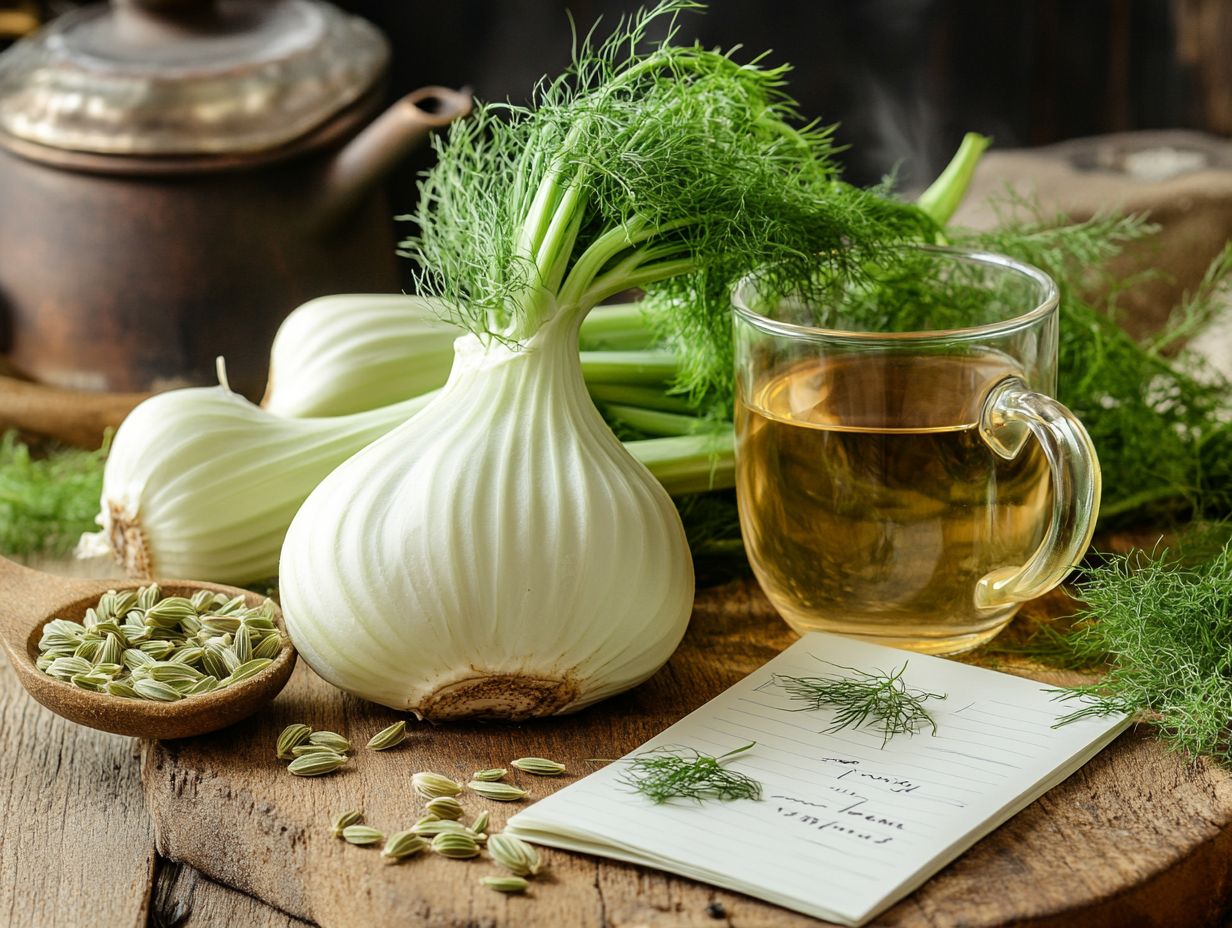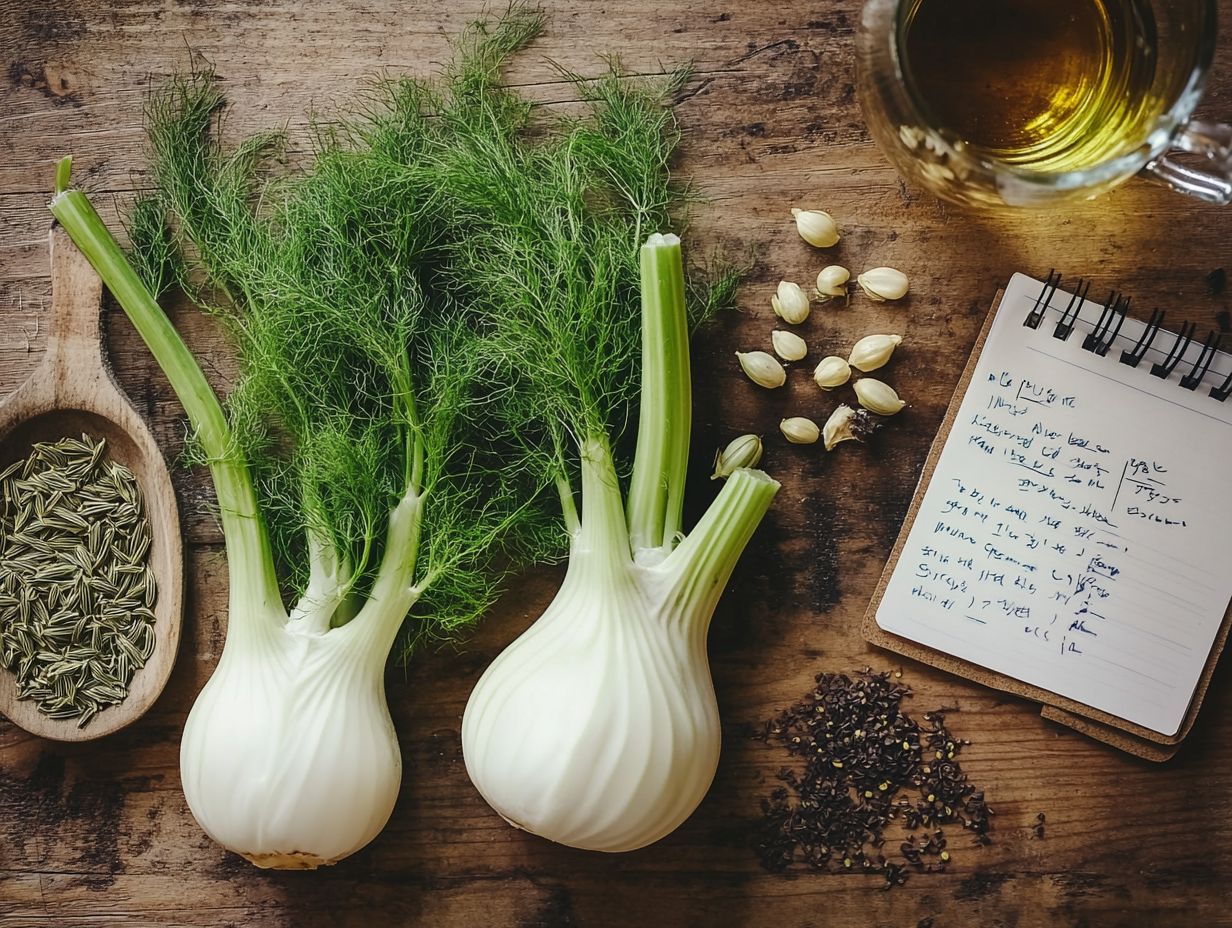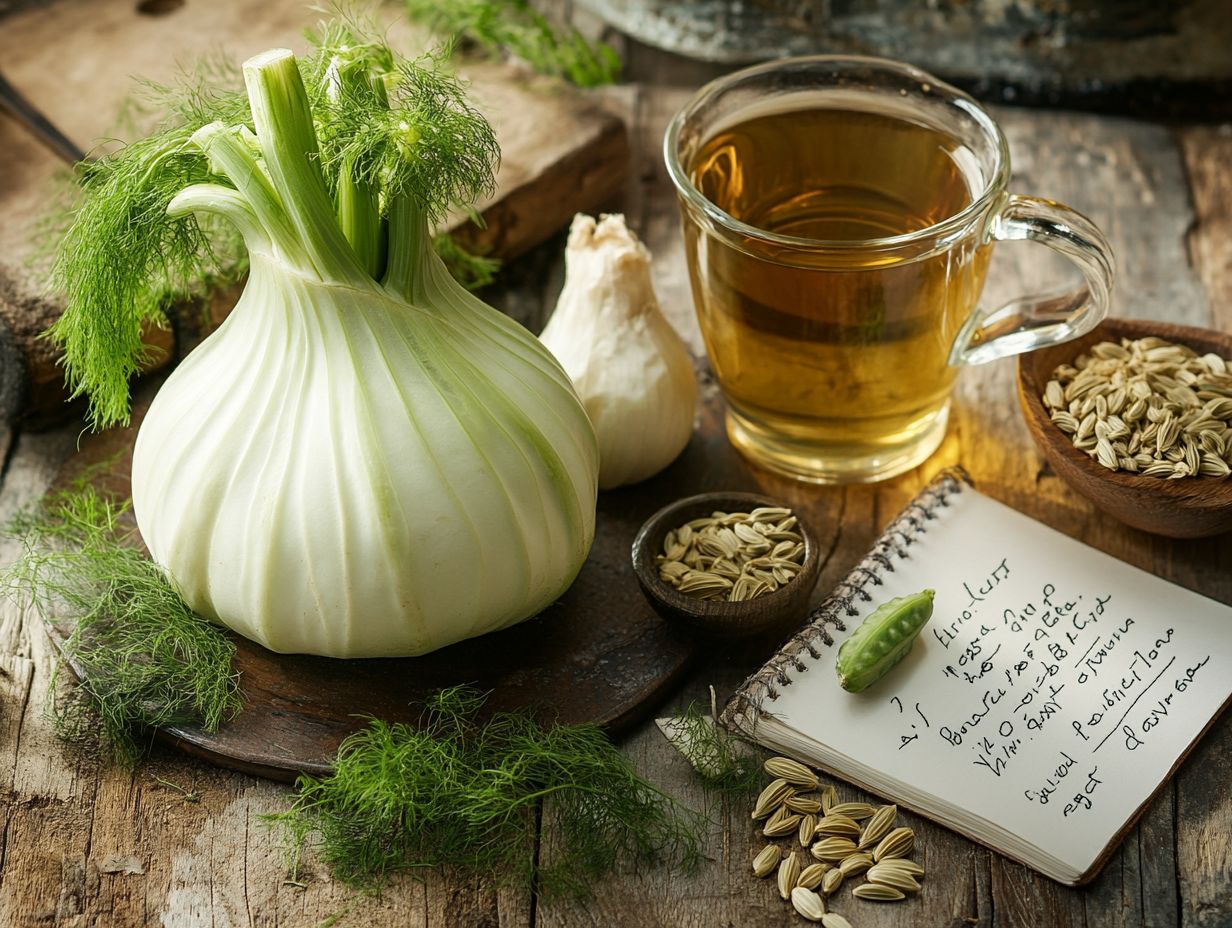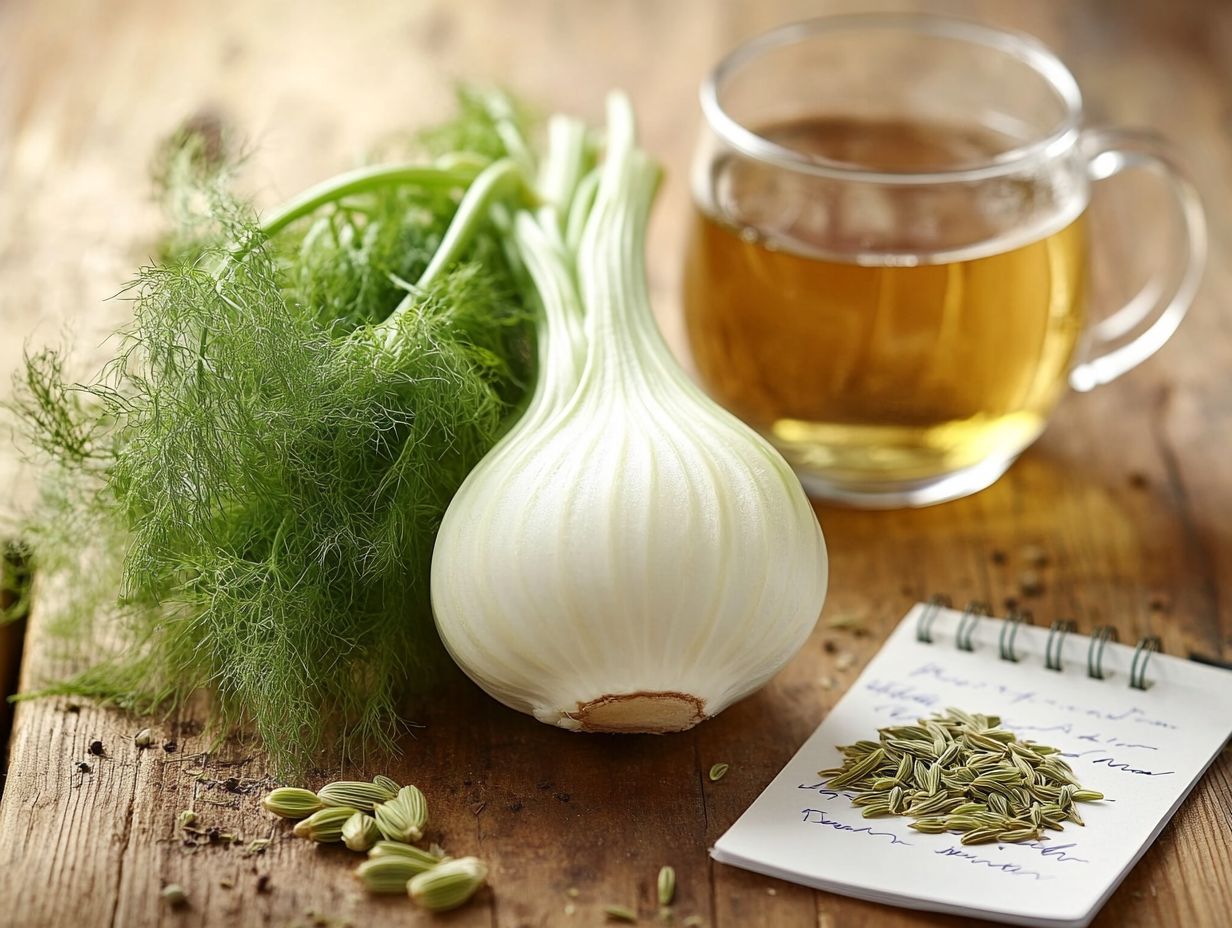The Impact of Fennel on Digestive Health
Fennel is not just a fragrant herb; it carries a rich history. It is a powerhouse of nutrients that can significantly enhance your health, including its remarkable benefits for managing weight and improving skin health.
With its distinct flavor and aroma, fennel plays a vital role in digestive health, potentially offering relief from various gastrointestinal issues.
This article delves into fennel s nutritional profile, its benefits for digestion, and practical ways you can incorporate it into your meals, including cooking with fennel.
It also highlights important precautions to consider, including its estrogenic effects. It s important to note that fennel may have estrogenic effects, meaning it can mimic estrogen in the body, which could affect hormonal balance. Don t miss out on how this versatile plant can transform your diet and boost your well-being!
Contents
- Key Takeaways:
- What is Fennel?
- Fennel’s Nutritional Profile
- Fennel’s Impact on Digestive Health
- How to Incorporate Fennel into Your Diet
- Potential Side Effects and Risks
- Health Benefits of Fennel
- Frequently Asked Questions
- What is fennel and how does it impact digestive health?
- How does fennel promote healthy digestion?
- What digestive issues can fennel help with?
- Can fennel be used to treat digestive disorders like IBS or Crohn’s disease?
- How can I incorporate fennel into my diet for digestive health?
- Are there any potential side effects of using fennel for digestive health?
Key Takeaways:

- Fennel is a flavorful herb with a long history of use in traditional medicine and cooking.
- It is a good source of vitamins, minerals, and antioxidants, which can provide various health benefits.
- Fennel can improve digestion by reducing gassiness, bloating, and inflammation. It may also help individuals with digestive conditions like Crohn s disease and ulcerative colitis.
What is Fennel?
Fennel, or Foeniculum vulgare if you want to be fancy, is a flowering plant from the carrot family. While it hails from the Mediterranean, it s now cultivated across the globe for both its culinary delights and medicinal virtues.
This aromatic herb boasts an impressive history, dating back to ancient remedies where it was prized not only for its flavor but also for its numerous health benefits, including promoting digestive health and possessing antimicrobial properties.
In herbal medicine, various parts of fennel, especially fennel seeds, are utilized, celebrated for their distinctive nutritional profile and roles in traditional healing practices, including ancient remedies.
Fennel’s Nutritional Profile
Fennel presents a remarkable nutritional profile, making it an invaluable addition to diets around the globe. It is particularly rich in dietary fiber, essential vitamins, and minerals think vitamin C, vitamin A, potassium, calcium, and magnesium all of which play a crucial role in enhancing your overall health and wellness.
With its impressive antioxidant properties, fennel not only supports skin health but also delivers vital micronutrients like selenium, vitamin K, and essential minerals such as potassium, calcium, and magnesium, which are fundamental for numerous bodily functions.
Fennel’s Impact on Digestive Health
People have loved fennel for its amazing benefits! Fennel functions not just as a flavorful culinary spice but also as a natural remedy for a range of gastrointestinal concerns. Its beneficial properties, including dietary fiber and essential oils, can effectively alleviate issues such as gassiness and colic (including postpartum colic), making it a preferred option in herbal remedies and traditional medicine.
Fennel tea provides a soothing experience that not only helps relieve discomfort but also promotes a healthier gut, aiding in pain relief during menstrual cramps.
How Fennel Affects Digestion

Fennel is a key player in enhancing your digestive health, offering dietary fiber and essential oils that help your gastrointestinal system function at its best. This not only prevents discomfort but also promotes overall wellness. Its antimicrobial properties fight harmful bacteria, fostering a balanced digestive environment.
The dietary fiber in fennel aids in regular bowel movements, helping to prevent constipation by adding bulk to your stool and enhancing its fiber. Meanwhile, the essential oils, like anethole, provide carminative effects, which help reduce gas and bloating. Together, these properties work harmoniously to soothe your digestive tract, making fennel a great choice for alleviating digestive issues.
Incorporating fennel into your meals or enjoying it as a herbal tea can enhance your gastrointestinal flora, leading to improved nutrient absorption and better gut health overall while serving as one of nature s most effective natural remedies. So whether you choose to savor it raw, cooked, or brewed, fennel offers various ways to support a more balanced digestive system.
Specific Digestive Conditions Treated by Fennel
Fennel is particularly effective in addressing specific digestive conditions like gassiness and colic, providing a natural solution for those seeking relief from uncomfortable symptoms, including digestive problems. Its anti-inflammatory properties make fennel tea a popular remedy for gastrointestinal distress. Studies link fennel to alleviating symptoms associated with chronic diseases.
This delicious herb helps reduce bloating and offers potential benefits for indigestion and irritable bowel syndrome (IBS), along with addressing food poisoning concerns. Scientific studies have shown that fennel contains compounds like anethole, which may help relax gastrointestinal muscles, easing stomach cramps and promoting smoother digestion. Its carminative effects are well-documented, effectively dispelling gas and relieving discomfort.
For those struggling with constipation, the mild laxative properties of fennel seeds can encourage regular bowel movements, making it a versatile ally in your digestive health toolkit. With the growing interest in herbal remedies, fennel emerges as a practical choice, supported by both traditional wisdom and emerging research.
How to Incorporate Fennel into Your Diet
Incorporating fennel into your diet offers an enjoyable and beneficial experience, thanks to its diverse culinary uses and delightful flavor. Whether you savor it fresh in salads, roast it to bring out its natural sweetness, or brew a comforting cup of fennel tea, you’ll discover countless ways to appreciate this versatile herb.
Beyond enhancing the taste of your dishes, fennel may also aid in appetite suppression and support your overall health, making it a valuable addition to your kitchen repertoire.
Recipes and Cooking Tips
You can incorporate a variety of delectable recipes that showcase the unique flavor and health benefits of fennel. Recipes range from roasted fennel and apple salads to fennel-infused soups and stews, including options that ensure food safety. Cooking with fennel boosts your dish’s flavor. Plus, it provides essential oils that help suppress appetite.
Exploring fennel’s culinary potential unveils endless possibilities, inviting you to experiment with its distinct anise-like flavor. Consider saut ing sliced fennel bulbs with garlic to create a robust base for pasta sauces, or grill them to infuse a smoky sweetness into your vegetable platters. For a refreshing twist, add finely chopped fennel fronds to salads for a delightful burst of brightness.
Incorporating this versatile vegetable not only enhances your meals but also brings impressive nutritional advantages. With its wealth of antioxidants and dietary fiber, fennel supports digestion and contributes to your overall health.
Don’t miss out on the chance to improve your digestive health with fennel! Try adding it to your next meal and feel the difference!
Potential Side Effects and Risks

While fennel is celebrated for its myriad health benefits, it s essential to be mindful of the potential side effects and risks tied to its consumption. These include potential interactions with other dietary supplements. This is especially true for its effects related to estrogen and potential interactions with other herbal remedies and medications.
If you have underlying health conditions or are pregnant, it s wise to exercise caution. Consulting with healthcare professionals will ensure your safety and well-being.
Precautions and Interactions
When you decide to incorporate fennel into your health regimen, it s essential to consider specific precautions and potential interactions. This is especially important if you’re taking dietary supplements or other herbal remedies that may enhance fennel s effects related to estrogen.
Being aware of these factors will help ensure safe consumption and allow you to maximize the benefits of this remarkable herb.
If you’re on hormone replacement therapy or have hormone-sensitive conditions, such as certain cancers, it s wise to approach fennel with caution. Consulting a healthcare provider to discuss any possible interactions is highly advisable.
If you re taking blood thinners, be mindful that fennel might influence blood clotting. If you re pregnant or breastfeeding, it’s crucial to seek professional guidance before adding this herb to your diet.
By taking these precautions, you can enjoy the therapeutic properties of fennel while minimizing any risks associated with estrogen in this herb.
Health Benefits of Fennel
Fennel boasts a fantastic range of health benefits, establishing itself as a vital ingredient in both culinary delights and herbal medicine. Thanks to its abundance of vitamin C and robust antimicrobial and anti-inflammatory properties, fennel is renowned for bolstering the immune system.
It also plays a key role in regulating blood sugar levels, making it especially advantageous for individuals managing chronic diseases or pursuing anti-diabetic effects. This contributes to overall heart health.
Summary of Key Benefits
Fennel is an exceptional herb that promotes digestive health and strengthens your immune system. It possesses impressive anti-inflammatory properties, making it a versatile choice in managing health conditions.
Its delightful flavor enhances a variety of dishes, making it a true culinary gem for anyone seeking to elevate their well-being.
Thanks to its rich antioxidant content, fennel helps detoxify your body. Compounds like anethole work wonders in alleviating bloating and gas, turning it into your go-to choice for digestive comfort.
The phytochemicals in fennel have been associated with combating oxidative stress, contributing to overall longevity. Traditional medicine practitioners have long valued this herb for its ability to ease menstrual cramps and address hormonal imbalances, underscoring its remarkable versatility.
Whether you choose to incorporate fennel into your salads, teas, or main meals, this herb not only enriches your dishes with a unique flavor profile but also acts as a potent ally in maintaining your health and vitality.
Frequently Asked Questions

What is fennel and how does it impact digestive health?
Fennel contains various compounds that contribute to its antimicrobial properties and anti-inflammatory properties. This makes it a powerful herb for supporting the gastrointestinal system.
Fennel is a herb commonly used in cooking and has traditionally been used for its medicinal properties. It contains anethole, a compound that has been shown to improve digestion and alleviate digestive issues.
Try adding fennel to your meals today and experience its amazing benefits!
How does fennel promote healthy digestion?
Fennel has anti-inflammatory properties that help reduce inflammation in the digestive tract. It also helps cut down on gas and bloating, making it effective for common digestive issues.
What digestive issues can fennel help with?
Fennel can help with various digestive problems like indigestion, bloating, gas, and constipation. It s also great for soothing stomach cramps and reducing nausea.
Can fennel be used to treat digestive disorders like IBS or Crohn’s disease?
Fennel may ease some symptoms of disorders like ulcerative colitis and Crohn’s disease, but it shouldn’t replace medical treatment. Always talk to a healthcare professional before using fennel for these issues.
How can I incorporate fennel into my diet for digestive health?
You can enjoy fennel raw, cooked, or as a supplement. Add it to salads, soups, or brew it into tea, but consult with a healthcare professional first, as it may interact with some medications.
Are there any potential side effects of using fennel for digestive health?
Fennel is generally safe, but some people may experience mild side effects like nausea or diarrhea. Start with small amounts and watch how your body reacts before consuming more.






